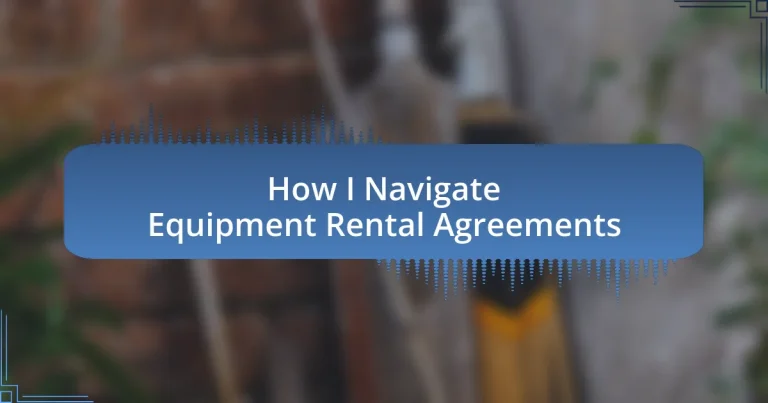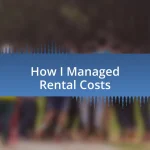Key takeaways:
- Understanding key rental terms like “security deposit,” “indemnification,” and “maintenance responsibilities” is essential for avoiding potential financial and legal pitfalls.
- Assess your specific rental needs and budget carefully to prevent overspending and ensure that the rented equipment meets actual requirements.
- Effective negotiation with rental providers can lead to customized agreements and unexpected benefits, enhancing the overall rental experience.
- Maintaining clear communication and organization while managing rented equipment fosters good relationships with providers and ensures compliance with safety standards.
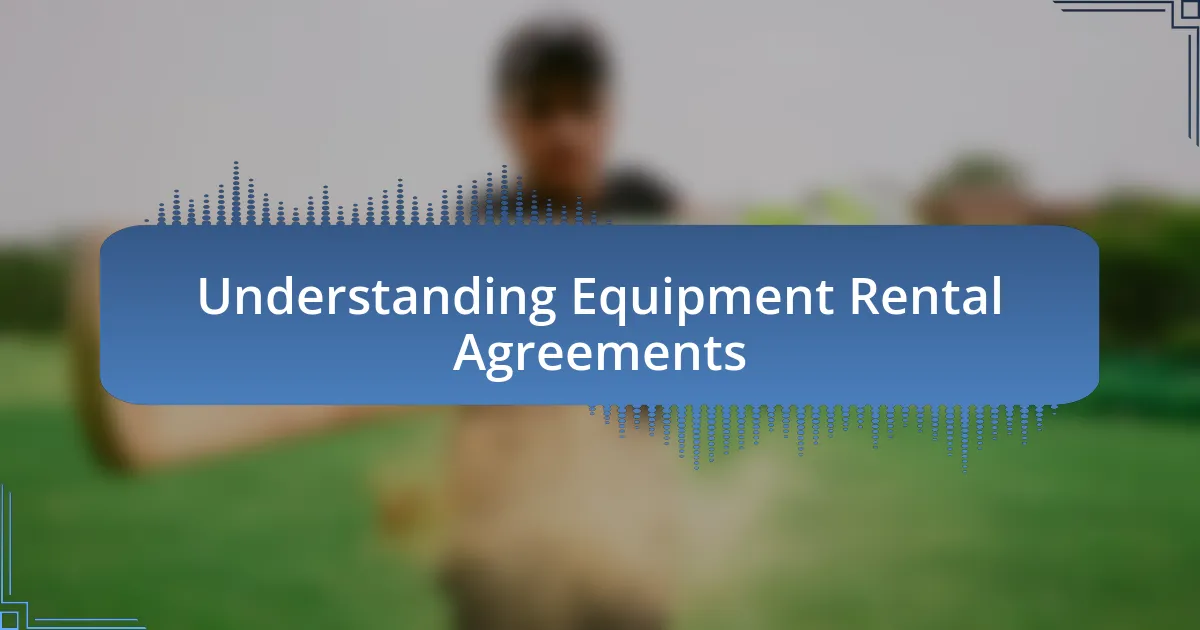
Understanding Equipment Rental Agreements
When I first encountered an equipment rental agreement, I was surprised by how dense the terminology could be. I remember feeling overwhelmed by all the legal jargon. It made me wonder: why can’t these agreements be more user-friendly? A clear understanding of terms like “liability,” “insurance coverage,” and “maintenance responsibilities” is crucial. Knowing what these terms mean can significantly impact your financial and legal obligations.
As I delved deeper into these agreements, I realized how essential it is to actively read each clause, instead of just signing on the dotted line. For instance, I found a clause that specified the penalties for late returns. It made me think about the importance of timing in any rental situation. Have you ever had that sinking feeling when you realize you’re late? That’s a scenario you want to avoid at all costs.
Additionally, I often found it helpful to ask questions before finalizing the contract. One time, I inquired about the insurance options, and it led to a discussion that clarified my understanding of coverage against possible damages. It was a small step, yet it gave me peace of mind. What about you? Do you feel comfortable asking questions before making commitments? Remember, clarity can save you from unexpected headaches down the line.
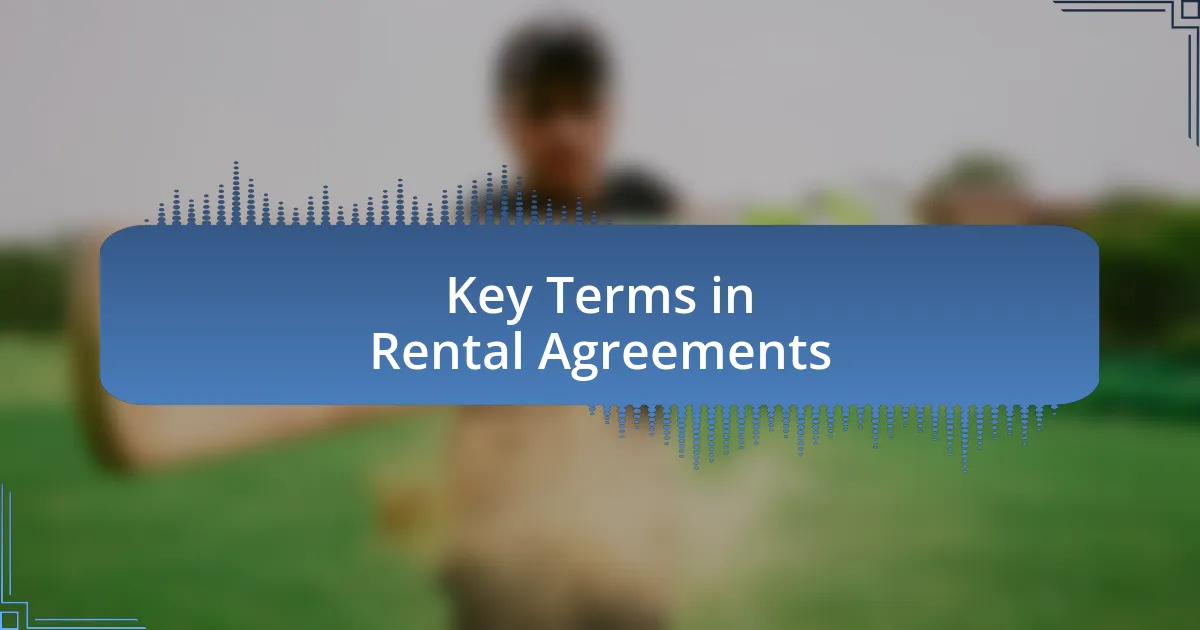
Key Terms in Rental Agreements
Understanding key terms in rental agreements can make all the difference in a smooth rental experience. I vividly recall a situation where the term “security deposit” threw me off. It was a significant amount, and I initially felt anxious, wondering if I would ever see it again. Learning that this deposit is usually applied to any damages or unpaid bills helped relieve my worries and provided insight into why it was necessary. Having this knowledge empowered me to make informed decisions.
Another term that often trips people up is “indemnification.” I had to look this one up the first time I encountered it because it sounded so daunting. In essence, it refers to protection from legal liabilities. When I understood that I could be responsible for damages caused by equipment while it’s in my possession, I realized the importance of understanding this term. This realization ensured I was more cautious when using the rented equipment.
Lastly, “maintenance responsibilities” is a term that negotiates the fine line between the renter and the rental company. There was this one time I returned a rented tool only to find out I was responsible for fixing minor wear and tear, which I hadn’t been aware of during the agreement signing. Now, I always clarify which maintenance tasks I’m accountable for to prevent any unwelcome surprises upon returning equipment.
| Term | Description |
|---|---|
| Security Deposit | A refundable amount paid to cover potential damages or unpaid fees. |
| Indemnification | A clause protecting against legal liabilities incurred during the rental period. |
| Maintenance Responsibilities | Specifies who is responsible for upkeep and repairs while using the equipment. |
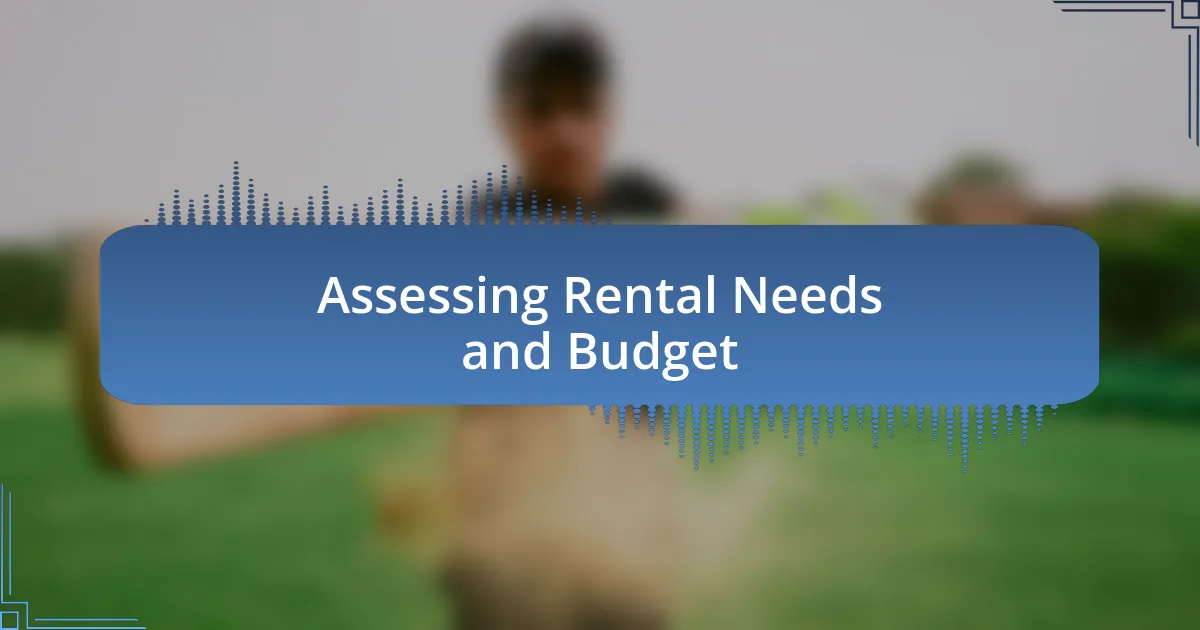
Assessing Rental Needs and Budget
When assessing your rental needs and budget, I find it crucial to first identify the specific equipment that will best serve the task at hand. In my experience, I once rented a high-end camera for a project, only to realize later that I didn’t need all its fancy features. This miscalculation led me to overspend unnecessarily. Taking the time to outline what you’ll truly require helps avoid this pitfall, ensuring that expenditure aligns with actual needs.
Here are some essential questions to consider during this assessment:
- What specific tasks will I be using the equipment for?
- How often will I need the equipment, and for how long?
- What is my maximum budget for rental fees, including deposits and insurance?
- Are there any additional costs, such as delivery or maintenance, that I should factor in?
- Can I rent the equipment during off-peak times to save money?
Budgeting is not just about finding the best prices; it’s about ensuring every dollar spent contributes to achieving your goals without straining your finances.

Comparing Rental Options Effectively
When I dive into comparing rental options, it’s essential to create a clear checklist of what each provider offers. I’ve used side-by-side spreadsheets in the past to lay out the specifics, like daily rates, rental terms, and any hidden fees. This kind of visual comparison really helps clear up confusion, allowing me to see at a glance which option provides the best value.
Sometimes, the cheapest option isn’t the best choice. I remember considering two different vendors for a generator—a lower price tempted me, but the other vendor offered a solid maintenance plan that provided peace of mind during a critical event. I had learned the hard way that skimping can lead to expensive emergencies, making it worth spending a bit more for reliability.
Furthermore, it’s essential to look beyond just the price tag. I often ask myself, “What’s the reputation of the rental company?” Reading online reviews and testimonials has guided my decisions on where to rent from; a well-reviewed company often means better support and service. After all, the goal is not just to rent equipment but to have a hassle-free experience that lets you focus on your project.
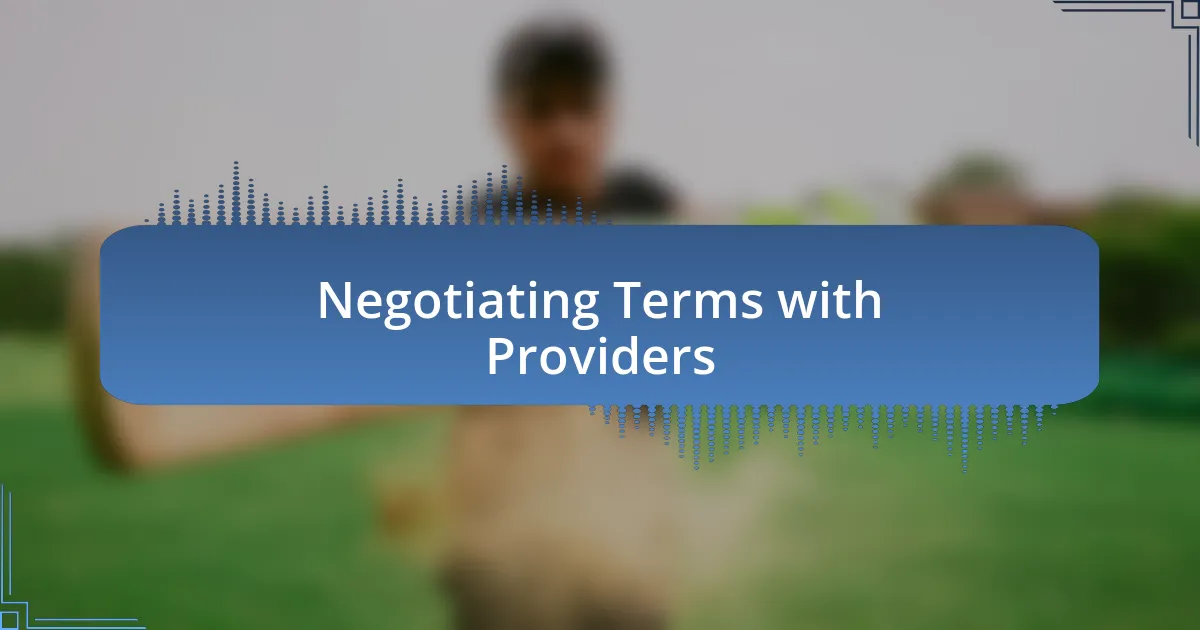
Negotiating Terms with Providers
One of the most important aspects of equipment rental agreements is negotiating terms with providers. I’ve found that approaching these conversations with clarity about my needs can really shift the balance in my favor. It’s almost freeing to articulate my specific requirements; for instance, I once needed a compact excavator and insisted on a flexible rental period because weather delays were a concern for my project.
When I opened the discussion, the provider initially pushed back on the standard terms. However, I asked questions like, “What options do you have for extensions if I face unforeseen delays?” This not only demonstrated my awareness of potential challenges but also encouraged the provider to offer a better solution tailored to my situation. It was incredible how that phrase alone opened up a dialogue about customized agreements that ultimately saved me money.
Moreover, I believe it’s essential to maintain a friendly yet assertive demeanor during negotiations. One time, I felt uneasy asking about discounts for longer rental durations, but I gave it a shot. To my surprise, the provider was willing to negotiate, which made me realize that asking questions can often lead to unexpected benefits. It’s a reminder of how crucial it is to approach negotiations as sharing a journey rather than a battleground.
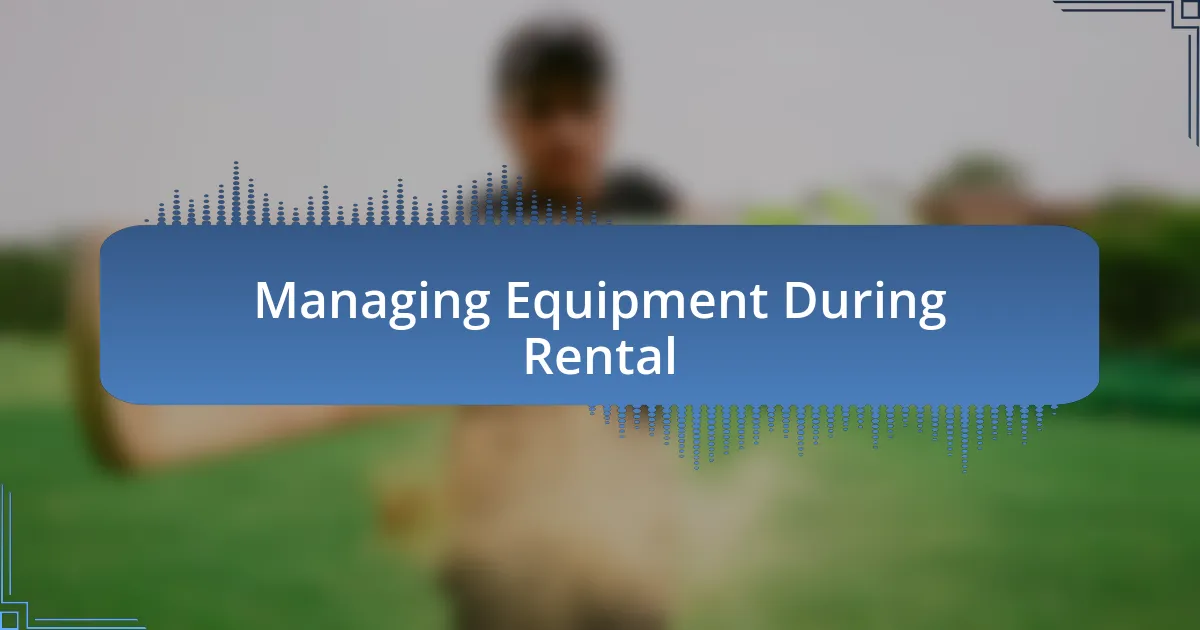
Managing Equipment During Rental
Managing equipment during rental can sometimes feel overwhelming, but I’ve discovered that staying organized makes all the difference. I always create an inventory list before picking up the equipment, noting down each item’s condition. This simple practice saved me a lot of headaches once when I returned a machine only to find out it had a pre-existing scratch that could have easily been blamed on me.
I’ve also learned the importance of regular communication with the rental provider throughout the rental period. For instance, when I rented a high-end power drill for a project, I experienced a minor malfunction. Instead of trying to troubleshoot it alone, I reached out to the provider for guidance. Their quick response not only resolved the issue but also gave me peace of mind knowing I had support in managing the equipment effectively.
After all, taking responsibility for rented equipment is crucial for building a good relationship with the provider. I remember a time when I neglected to report a small issue, thinking it was insignificant. When I returned the equipment, it became a point of contention. Since then, I’ve made it a goal to keep open lines of communication, as I believe transparency fosters collaboration. Wouldn’t you agree that a good relationship can be beneficial in future rentals?
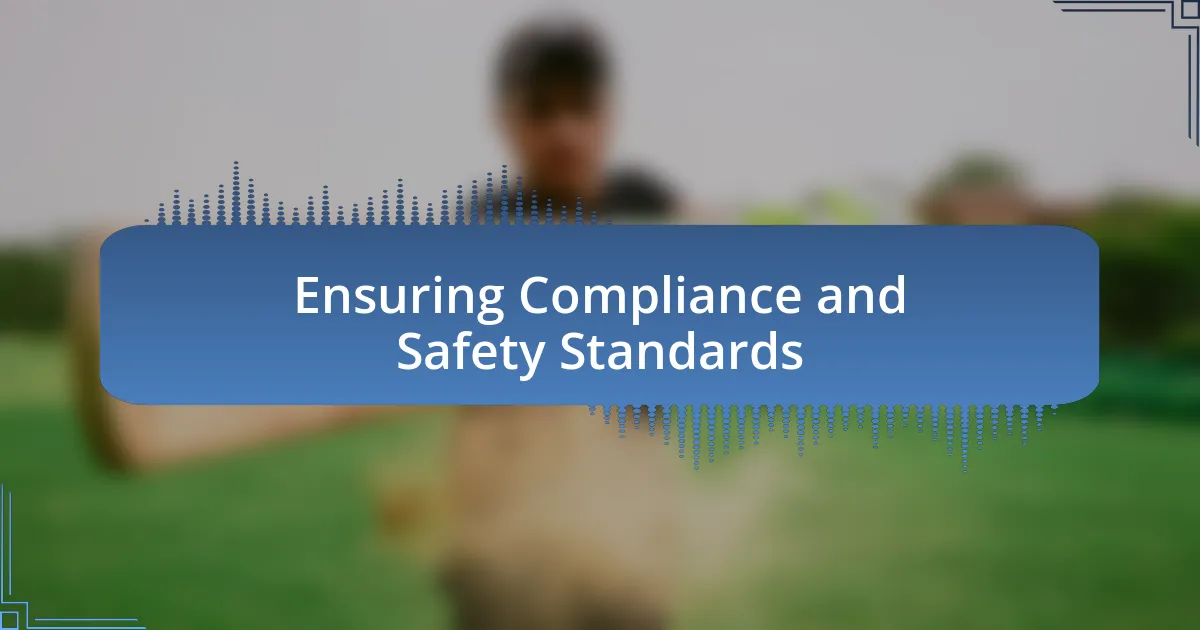
Ensuring Compliance and Safety Standards
Ensuring compliance with safety standards is non-negotiable in the world of equipment rental. I vividly recall a time when I was about to operate a scaffolding unit without double-checking the safety features. A quick call to the rental company revealed that I needed additional safety gear, which ultimately kept me safe and reinforced the importance of following compliance guidelines. Have you ever considered how a small oversight could lead to significant consequences?
Another crucial aspect is thoroughly reviewing the rental agreement for safety stipulations. The first time I skimmed through an agreement, I missed essential details regarding equipment usage and operator requirements. When I later faced a safety inspection, I realized my error and faced potential penalties. Since then, I take the time to highlight safety-related clauses, ensuring I’m always in the know.
I also believe that each rental experience should include asking the provider about safety training or operational tips. During my last rental, I took the initiative to inquire about best practices for equipment handling. The provider not only appreciated my question, but they also offered valuable insights, enhancing my comfort level and boosting my confidence in using the equipment. Isn’t it refreshing to know that a little curiosity can lead to a safer and more enjoyable rental experience?
